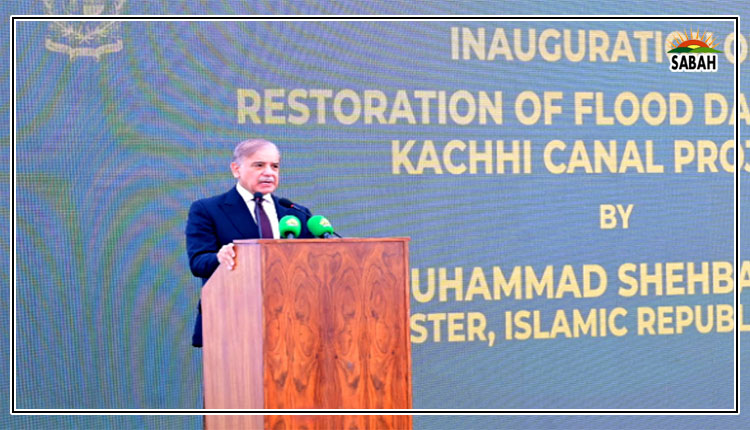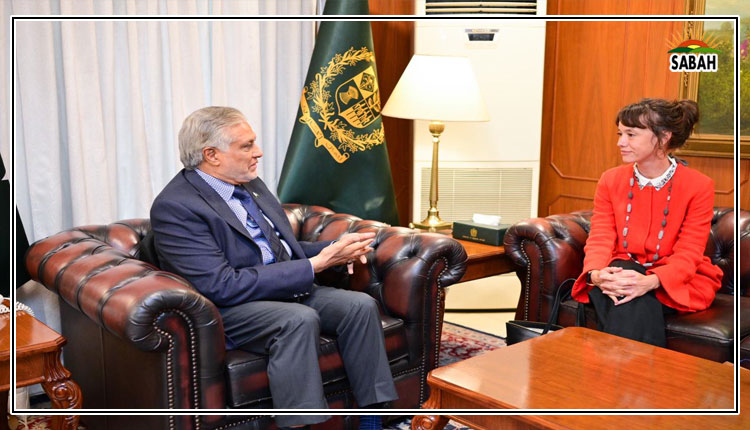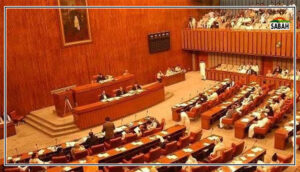Senate of Pakistan passes 26th Amendment Bill 2024 with 65 members voting in favor of the amendment, while four members opposed it
ISLAMABAD, Oct 20 (SABAH): The government finally powered the disputed 26th Constitutional Amendment Bill, 2024, through the Senate on Sunday, extending the Chief Justice of Pakistan’s (CJP) tenure up to three years, amid opposition from the Pakistan Tehreek-e-Insaf (PTI).
Federal Minister for Law Azam Nazeer Tarar Advocate presented the 26th constitutional amendment in the Upper House and subsequently moved a motion for its approval, which was passed with a two-thirds majority in the House, with 65 members voting in favor of the amendment, while four members opposed it.
The bill was tabled hours after the federal cabinet approved the draft amendments after hanging in balance for weeks. The voting was completed following which the upper house of the Parliament approved all 22 clauses of the bill.
The political leaders continued to hold consultations on the constitutional tweaks till late Saturday night, with uncertainty regarding the tabling of the draft due to severe opposition from the PTI.
The coalition government was initially set to present the legislation on Saturday but decided to defer it at the request of the Jamiat Ulema-e-Islam-Fazl (JUI-F) Chief Maulana Fazlur Rehman who said that his party would be able to cast its votes in favour of the 26th constitutional amendment after receiving a response from the PTI.
The former ruling party has time again expressed concerns over the prospective judiciary-oriented legislation provisioning a fixed three-year term of the Chief Justice of Pakistan (CJP), establishment of constitutional benches, restructuring of the Supreme Judicial Council, and the formation of a Special Parliamentary Committee which will suggest names from amongst the three most senior judges of the apex court for the CJP’s appointment.
Addressing the Senate session on Sunday, Federal Minster for Law and Justice Azam Nazeer Tarar said that the government’s allied parties and Jamiat Ulema-e-Islam-Fazl (JUI-F) reached a consensus on the draft of the constitutional amendment bill.
As part of the government’s efforts, a special parliamentary committee comprising representatives of all the political parties discussed the proposed constitutional package.
The law minister, speaking on the floor of the Upper House, requested Senate Chairman Makhdoom Syed Yusuf Raza Gilani to allow him to table the draft of the 26th Amendment Bill.
He pleaded with the chairman that the proposed amendments should be tabled in the House as a supplementary agenda. He informed the House that the procedure to appoint judges had been changed in the 18th Amendment.
“Chief Justice of Pakistan (CJP) Qazi Faez Isa has consistently expressed his lack of interest in extending his tenure as the top judge,” the law minister said in response to the criticism from the opposition.
Once again, dispelling the widespread notion, the minister categorically stated that CJP Isa would retire as scheduled.
Additionally, the minister mentioned that one of the draft amendments pertained to the constitutional benches of the apex court.
Stressing the necessity of judicial reforms, Tarar, without specifically naming anyone, referred to a former chief justice who frequently issued suo moto notices. Furthermore, Tarar remarked, “Our courts sent elected prime ministers home.”
Detailing the bill, the law minister said that a constitutional bench would be established within the Supreme Court.
He added that the judges would be appointed by the judicial commission, and the commission should have the authority to assess the judges’ performance.
“Constitutional benches will be formed by the commission, and the term of the top court would be limited to three years, with the top judge being selected from the three senior-most judges of the apex court,” Tarar said giving an overview of the bill.
To enhance the legislature’s role in appointing judges, Tarar mentioned that the 12-member parliamentary committee, with a two-thirds majority, would appoint the CJP.
In the updated draft, it was also noted that constitutional benches could be established in the provinces. The minister emphasised that the purpose of the bill was to provide prompt and affordable justice to the common man and urged the Upper House to vote in favour of the bill.
Speaking on the upper house floor, PTI Senator Barrister Syed Ali Zafar termed the Constitution a “social contract”, that unites the nation. “If there is no consensus, the Constitution will die its own death,” he said.
He pointed out that the Constitution is formed with the consent of the people and the “amendments should also be made with their consent.”
Zafar cited the example of Article 58(2)(b) — which empowers the president to dissolve the government — saying that both Pakistan Muslim League-Nawaz (PML-N) and Pakistan Peoples Party (PPP) governments became targets of this amendment.
“Such amendments, which are made without consensus, can damage the country’s democracy.”
He noted that it had been decided in PTI’s parliamentary committee meeting that they would not vote on the constitutional amendment.
“We have taken signatures of all our members […] If any of our members vote, then do not count it,” the PTI Senator asked the Senate Chairman.
He further said that they were not part of “any process” and had not provided a “single clause”.
Referring to his 45-minute meeting with Imran Khan, Zafar said the PTI founder was unaware of the country’s political situation and questioned the urgency for the passage of constitutional amendment before October 25 — the day the incumbent chief justice would retire. Speaking of the draft, he pointed out that there were “serious mistakes” which should be addressed.
“A constitutional court isn’t being formed but constitutional benches are,” he said, adding that the process of appointing judges has been kept by the government. “There will be a huge confusion as to which cases will be heard by constitutional benches,” he noted.
In her speech on the floor of the upper house of the parliament, PPP Senator Sherry Rehman criticized the opposition for not proposing a single point during the 10 sittings of the parliamentary committee.
She emphasised that their actions were not an “attack” but rather paving the way for the parliament to claim its rights.
The PPP lawmaker also praised Bilawal Bhutto-Zardari for his efforts in building a broader consensus on the constitutional package among the political parties.
After the speeches, the House passed the motion to vote on the constitutional amendments by majority vote. Before the voting, opposition lawmakers demanded that PML-N leader Rana Sanaullah and the Attorney General of Pakistan (AGP) be sent out of the House. However, the treasury senators asserted that it was their — Sanaullah and AGP — constitutional right to sit in the House.
After conducting voting on the 26th Constitutional Amendment, Chairman Senate Makhdoom Syed Yusuf Raza Gilani announced the results. 65 members voted in favour of the constitutional amendment and 4 members voted against the constitutional amendment.











